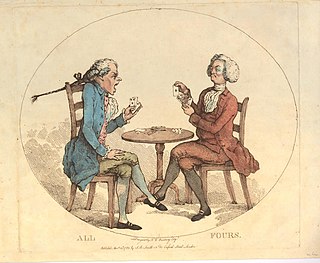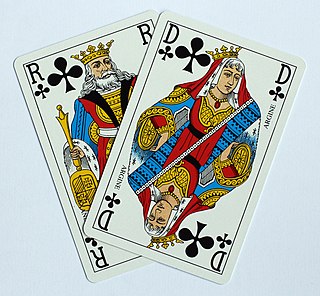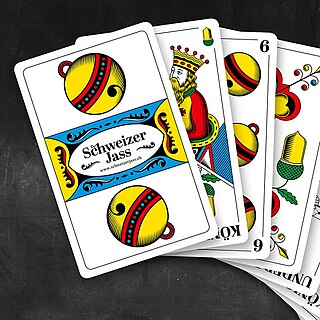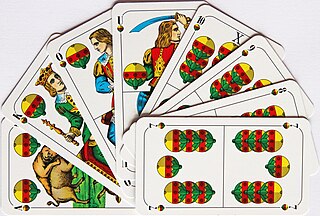
A trick-taking game is a card or tile-based game in which play of a hand centers on a series of finite rounds or units of play, called tricks, which are each evaluated to determine a winner or taker of that trick. The object of such games then may be closely tied to the number of tricks taken, as in plain-trick games such as Whist, contract bridge and Spades, or to the value of the cards contained in taken tricks, as in point-trick games such as Pinochle, the Tarot family, Briscola, and most evasion games like Hearts. Trick-and-draw games are trick-taking games in which the players can fill up their hands after each trick. In most variants, players are free to play any card into a trick in the first phase of the game, but must follow suit as soon as the stock is depleted. Trick-avoidance games like Reversis or Polignac are those in which the aim is to avoid taking some or all tricks.

All Fours is a traditional English card game, once popular in pubs and taverns as well as among the gentry, that flourished as a gambling game until the end of the 19th century. It is a trick-taking card game that was originally designed for two players, but developed variants for more players. According to Cotton, the game originated in Kent, but spread to the whole of England and eventually abroad. It is the eponymous and earliest recorded game of a family that flourished most in 19th century North America and whose progeny include Pitch, Pedro and Cinch, games that even competed with Poker and Euchre. Nowadays the original game is especially popular in Trinidad and Tobago, but regional variants have also survived in England. The game's "great mark of distinction" is that it gave the name 'Jack' to the card previously known as the Knave.

Bezique or Bésigue is a 19th-century French melding and trick-taking card game for two players. The game is derived from Piquet, possibly via Marriage (Sixty-six) and Briscan, with additional scoring features, notably the peculiar liaison of the and that is also a feature of Pinochle, Binokel, and similarly named games that vary by country.
A (bridge) signal is a move in the card game of contract bridge in which partners defending against a contract play particular cards in a manner which gives a coded meaning or signal to guide their subsequent card play. This may also be referred to as carding. Signals are usually given with the cards from the two-spot to the nine-spot. There are three types of signals:
In trick-taking games, to ruff means to play a trump card to a trick. According to the rules of most games, a player must have no cards left in the suit led in order to ruff. Since the other players are constrained to follow suit if they can, even a low trump can win a trick. In some games, like Pinochle and Preferans, the player who cannot follow suit is required to ruff. In others, like Bridge and Whist, he may instead discard. Normally, ruffing will win a trick. But it is also possible that a subsequent player will overruff. This is not always a bad thing—see uppercut below.

Ombre or l'Hombre is a fast-moving seventeenth-century trick-taking card game for three players and "the most successful card game ever invented."
Bourré is a trick-taking gambling card game primarily played in the Acadiana region of Louisiana in the United States of America. It is also played in the Greek island of Psara, with the name Boureki. The game's closest relatives are probably Spades and Euchre; like many regional games, Bourré sports many variant rules for both play and betting considerations.

Belote is a 32-card, trick-taking, Ace-Ten game played primarily in France and certain European countries, namely Armenia, Bulgaria, Croatia, Cyprus, Greece, Luxembourg, Moldova, North Macedonia, Bosnia and Herzegovina and also in Saudi Arabia. It is one of the most popular card games in those countries, and the national card game of France, both casually and in gambling. It was invented around 1920 in France, and is a close relative of both Klaberjass and Klaverjas. Closely related games are played throughout the world. Definitive rules of the game were first published in 1921.

Jass is a trick taking, Ace-Ten card game and a distinctive branch of the Marriage family. It is popular throughout the Alemannic German-speaking area of Europe, as well as in Romansh-speaking Graubünden and the French-speaking area of Switzerland, German-speaking South Tyrol in Italy, and in a couple of places in Wisconsin, USA and Tuscarawas County, Ohio, USA.
A bridge maxim is a rule of thumb in contract bridge acting as a memory aid to best practice gained from experience rather than theory.
Two-ten-jack is a Japanese trick-taking card game for two players that takes its name from the three highest-scoring cards in the game: the 2, 10 and Jack in three different suits.
A trump is a playing card which is elevated above its usual rank in trick-taking games. Typically, an entire suit is nominated as a trump suit; these cards then outrank all cards of plain (non-trump) suits. In other contexts, the terms trump card or to trump refers to any sort of action, authority, or policy which automatically prevails over all others.

Mariage or Mariagenspiel is a German 6-card trick-and-draw game for two players in which players score bonus points for the "marriage" of King and Queen of the same suit. The game, first documented in 1715 in Leipzig, spawned numerous offshoots throughout continental Europe and gives its name to the Marriage group of card games, the widest known of which is probably Sixty-Six. Many of these are still the national card games of their respective countries. It is unrelated to the Nepalese game of Marriage.
Court Piece is a trick-taking card game similar to the card game whist in which eldest hand makes trumps after the first five cards have been dealt, and trick-play is typically stopped after one party has won seven tricks. A bonus is awarded if one party wins the first seven tricks, or even all tricks. The game is played by four players in two teams, but there are also adaptations for two or three players.

Einwerfen or Zählspiel is a German 8-card point-trick game for four players in two teams of two and using a 32-card German-suited pack. Its closest relative is the popular Portuguese game Sueca. Perhaps the most basic and typical representative of the Ace-Ten card games, this game was first described as early as 1811, but may be considerably older.

Officers' Skat (Offiziersskat), is a trick-taking card game for two players which is based on the rules of Skat. It may be played with a German or French pack of 32 cards which, from the outset of the game, are laid out in rows both face down and face up. As in Skat, tricks are taken and card points counted to determine the winner of a round; game points are then awarded to decide the winner of a game. It is also called Two-hand Skat, Sailors' Skat (Seemannsskat), Farmers' Skat (Bauernskat), Robbers' Skat (Räuberskat) or Coachmen's Skat (Kutscherskat)

German Schafkopf is an old German card game and the forerunner of the popular modern games of Skat, Doppelkopf and Bavarian Schafkopf. Today it is hardly ever played in its original form, but there are a number of regional derivations.

Wendish Schafkopf, Wendisch or Wendsch is a card game for four players that uses a Schafkopf pack of German-suited cards or a Skat pack of French playing cards.

Bolachen is a traditional card game for 3 players that is played in Upper Bavaria. It is threatened by extinction.

Bura is a Russian, Ace-Ten, card game that is "particularly characteristic of Russian prisoners and ex-prisoners. Its alternative name of Thirty-One refers to the combination of three trump cards that wins the game. One of the main variants of this game is known as Kozel ("goat") or Bura Kozel. It is a point-trick game with the unusual feature that players may lead several cards of the same suit at once.